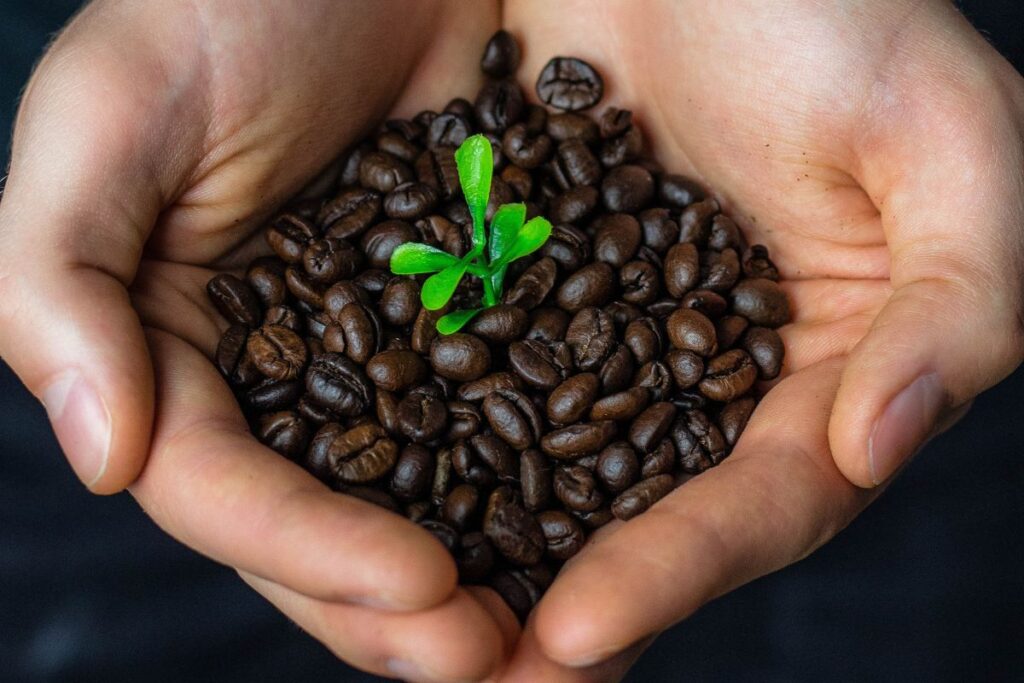There’s a wave of “organic” products moving around everywhere you go. In the coffee world, it’s stronger like never before.
That’s why I want to invite you to this roller coaster as we go on a ride to find the most interesting organic coffee facts every coffee lover should know!
Here we go!
By Lilian.
Published on 09.01.2022
Affiliate disclosure
This page may contain affiliate links – we may earn a small commission when you make a purchase through these links. This is at no extra cost to you.
Organic Coffee Grows with Zero Chemicals
With organic coffee, be sure that your favorite drink has been produced with no chemical fertilizers or pesticides!
You see, regular coffee is the most chemical-sprayed crop in the world.
But for organic coffee, there’s no exposure to chemical fertilizers or pesticides.
According to The Coffee Maven, Bryan De Luca, organic coffee farmers use natural methods to increase soil fertility and manage diseases.
For instance, to increase soil fertility, they can use chicken/cow/pig manure, general compost, or any other natural soil fertility boosters.
For disease control, organic coffee farmers have to employ organic disease control methods such as organic fungicides.
Organic Coffee Grows in the Shade
According to Café Campesino, one of the requirements for organic coffee certification is the presence of shade trees on the coffee farms.
The coffee grows under a canopy of tall trees that keep it away from direct sunlight. Exposure to direct sunlight scorches the soil, leaving no option but to use chemical fertilizers to restore soil nutrients.
What are the benefits of shade-grown coffee?
Shade-grown coffee has a higher quality taste because the beans mature slowly, allowing the natural sugars to increase steadily.
The result is a higher quality flavor!
Crop Rotation is Mandatory in Organic Coffee Farms
What is crop rotation?
The Rodale Institute defines crop rotation as the practice of planting different crops with different food requirements consecutively on the same land.
Crop rotation is fantastic because it breaks disease cycles, prevents soil depletion, and also improves soil health.
In organic farming, crop rotation is a must!
It returns nutrients to the soil without having to add synthetic boosters.

Organic Coffee Comes in 3 Levels/Degrees
The USDA identifies 3 degrees of organic products in the certification plan.
The difference lies in the amount of the product that’s produced organically.
The 3 organic grades/levels:
- Made with Organic – at least 70% organic
- Organic – at least 95% organic
- 100% organic – every ingredient is fully organic
So, in coffee’s case, because coffee mainly has one ingredient – coffee beans – if the coffee beans are produced in fully organic farming methods, then the coffee will be termed 100% organic.
According to Kiran Patil, the founder of Organic Facts, organic coffee lovers should always look for “100% Organic Coffee” beans. Not “Organic” or “Contains Organic” coffee.
Most of the World’s Organic Coffee is From Latin America!
Latin America produces 75% of the organic coffee consumed around the world.
Out of this 75%, Mexico is the leading organic coffee bean producer in the region.
It exports organic coffee worth $400+ million every year!
Other top organic coffee producers include Peru, Brazil, Colombia, Guatemala, and El Salvador.
There are also a few African countries that export organic coffee, including the DRC, Kenya, Ethiopia, and Uganda.
There are So Many Benefits of Organic Coffee
For one, organic coffee is coffee like any other.
According to Rachael Link, a registered dietician, coffee boosts energy levels, improves brain and heart health, protects the liver from cirrhosis, and also reduces the risk of Type 2 Diabetes.
So, what benefits are unique to organic coffee?
Coffeehouse Express mentions that because of the high antioxidant, vitamin, and mineral levels in organic coffee, organic coffee lovers can even enjoy a stronger immune system.
With organic coffee, forget about those frequent doctor appointments!
Another benefit is that organic coffee grows with no chemical fertilizers or pesticides, so, the risk of ingesting chemical-ridden drinks every morning is at zero.
To truly understand the weight of this, let me remind you that regular coffee is the most chemical-sprayed crop in the world…
Organic Coffee Pods are Still Around!
Are you an organic coffee lover that wants to enjoy their coffee stress-free even in your workplace?
I have some good news! Get some organic coffee pods!
They come as small packets, more like tea bags, packed with ground organic coffee. They’re packed in cloth pods or filter paper and each pack is enough for one cup of organic coffee.
All you need is a cup of hot water!
Drop a pod in there and continue to sip on your favorite coffee uninterrupted!
Organic Coffee Nutrition Facts Prove that it’s Healthier than Regular Coffee!
Coffee is generally not a nutrient-loaded drink, but it still has a few essential nutrients.
The nutrients are better preserved under natural farming methods, which brings about organic coffee.
The best perk of organic coffee is its antioxidants. It’s an anti-oxidant bomb!
What’s more, the Venetian Coffee Roasters find more micronutrients such as Vitamins B, potassium, magnesium, and minerals in organic coffee.
Eco BNB specifies that organic coffee is rich in Vitamins B1, B2, B3, and B5.
Organic Coffee Tastes Better than Regular Coffee
Beauty lies in the eyes of the beholder, right? How about taste? Does it “lie on the tongue of the taster”? (ha-ha).
That’s a story for another day…but:
According to Corporate Coffee Systems, most coffee lovers find organic coffee tastier!
Some say that it tastes cleaner than regular coffee, others say it’s smoother.
Personally, I find organic coffee flavor fruity or nutty compared to the sour and bitter regular coffee.
Who has the Mandate to Label Coffee “Organic”?
Well, it depends on where the coffee is being sold.
For instance, if it’s in the US, The Department of Agriculture – USDA – gets to label the coffee organic.
In the UK, The Soil Association handles this business.

Not all Organic Coffee is Fairtrade Coffee
This is not the news you expected. Right?
Coffee can be organic, but not fair trade.
Fair trade coffee is coffee whose production process has been audited and found to meet all the fair trade standards.
Some of the fair trade standards include:
- No child labor on the farms
- Good/safe working conditions
- Sustainability of the production process
- Environmental preservation, etc.
From these fair trade standards, then you can tell that it’s possible to have coffee that meets all fair trade standards, but is non-organic.
Organic Coffee is Sustainable – Great for our Environment!
In case you haven’t thought about it, organic coffee is not only good for you, but also for the environment.
First, with organic coffee farming, forget about cutting down trees to plant coffee.
Because the coffee plants need to grow away from direct sunlight, farmers plant coffee around tall trees! No cutting them down!
Let me remind you that trees reduce global warming by absorbing carbon dioxide in the atmosphere…
Second, the tall trees around the organic coffee farms are home to different birds.
Add that to your coffee bucket list – bird watching in the coffee farms!
What do you love about organic coffee?
Photos by Sarahs_Captured_Moments/7, gedsarts and Niclas Illg





